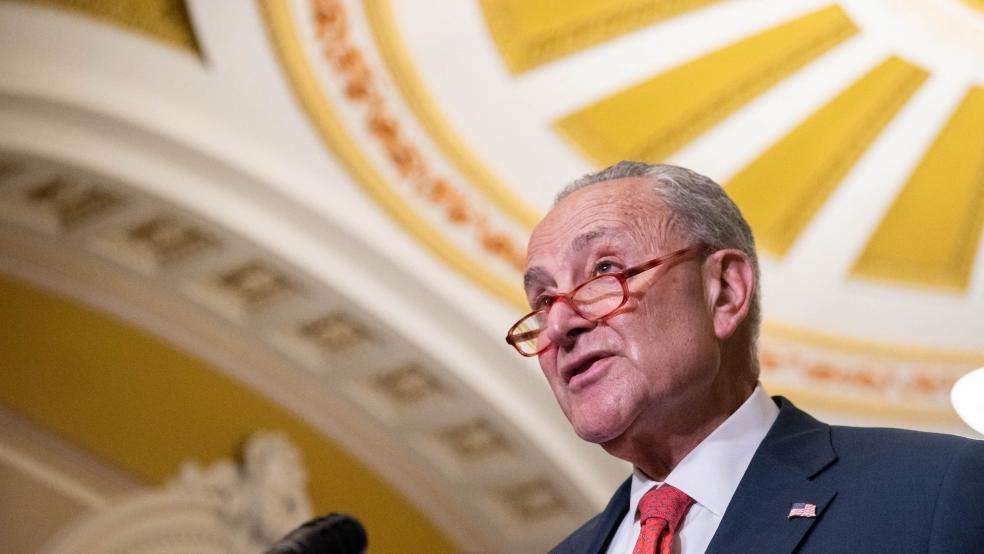As lawmakers try to map a route out of the mess they’ve made for themselves, Senate negotiators on Tuesday unveiled a bipartisan plan to fend off a looming federal shutdown set to start on Sunday unless Congress acts. Still, even as leaders in both chambers of Congress prepared to move ahead with efforts to address the potential shutdown, it’s not clear that any of the plans being discussed have a realistic chance of success.
Here’s a rundown of where things stand:
The Senate: The newly unveiled bipartisan stopgap bill would extend current funding levels through November 17, and include $6 billion for disaster relief and $6.2 billion for Ukraine aid, both less than requested by the White House.
Senate Majority Leader emphasized that the bill is “a bridge, not a final destination” — it is simply meant to keep the government open while spending talks continue.
Even so, the inclusion of funding for Ukraine could be an obstacle. While senators from both parties want to honor President Joe Biden’s request for additional aid, a growing number of Republicans are expressing concerns, including Republican Sen. Rand Paul, who has pledged to delay any such effort. Both the Ukraine aid and the overall funding levels would be a problem for Republicans in the House, should the Senate’s continuing resolution pass.
“The measure effectively punts bigger fights on Ukraine aid and disaster relief in order to move the agreement more quickly through the Senate, as conservatives threaten to delay the bill amid objections to Ukraine funding and other issues,” Politico’s Caitlin Emma reports. “All 100 senators have to agree to greenlight fast passage under the chamber's rules, otherwise a final vote wouldn't occur until after the shutdown deadline had passed.”
The Senate is planning to take a procedural vote Tuesday night on a bill that would reauthorize the Federal Aviation Administration, and that measure could be used as a vehicle for the stopgap funding plan, which appears likely to clear the Senate sooner or later, setting up a challenge for House Speaker Kevin McCarthy.
The House: Facing fierce resistance from his right flank, McCarthy has set aside an effort to pass a stopgap spending bill. Instead, starting Tuesday evening, the California Republican plans to bring up four appropriations bills (Defense, Agriculture, Homeland Security and the State Department), with the idea that passing them quickly will give him leverage in negotiations with the Senate and create goodwill with House conservatives, even if it won’t do much to prevent a shutdown.
But first the House must pass “rules” that would allow the bills to be debated, and it’s not clear that those rules will make it. Normally uncontroversial, the rule for the Defense funding bill has failed twice due to opposition from some conservatives — including Rep. Marjorie Taylor Greene, who says she is a “hard no” on opening debate — to provisions that would provide additional aid to Ukraine.
Punchbowl’s Jake Sherman said Tuesday that House leaders think the defense rule could pass this time around, though maybe to little effect. “[T]he prevailing wisdom in House GOP circles is that all four approps bills could fail this week,” he added.
Perhaps sensing that possible failure, McCarthy tried a new tactic Tuesday: calling for a meeting with the White House to discuss border policy.
“I think it'd be very important to have a meeting with the president,” McCarthy told reporters, suggesting that Biden could help resolve at least some of the conflicts in Congress by making changes at the border with Mexico, and thereby open the door to the passage of a continuing resolution. "I believe in good faith, if the president wants to help secure this border, which Americans on both sides of the aisle are asking… if he's willing to take some actions to even sit down with us to make some changes along that border, we can keep government open while we finish,” McCarthy said.
It’s not clear, however, that McCarthy could deliver on that proposal, even if the White House were to agree.
President Joe Biden: The White House has largely been content to sit back and watch as Republicans tear themselves up over the need to fund the government. Late Monday Biden called on Republicans to abide by the funding agreement they made in June as part of the deal to raise the debt ceiling — an agreement that some conservative Republicans have sought to evade by slashing discretionary spending in 2024 as they write their appropriations bills. “We made a deal, we shook hands, and said this is what we’re going to do,” Biden said. “Now, they’re reneging on the deal.”
House conservatives don’t appear to be interested in changing course. Instead, they have reportedly pushed harder to cut spending by another $60 billion beyond levels that Democrats already said were unacceptable.
The bottom line: Expect to see some frantic maneuvering in Congress over the next few days as the deadline draws closer. Whether all that activity will help avert a shutdown is still an open question.




